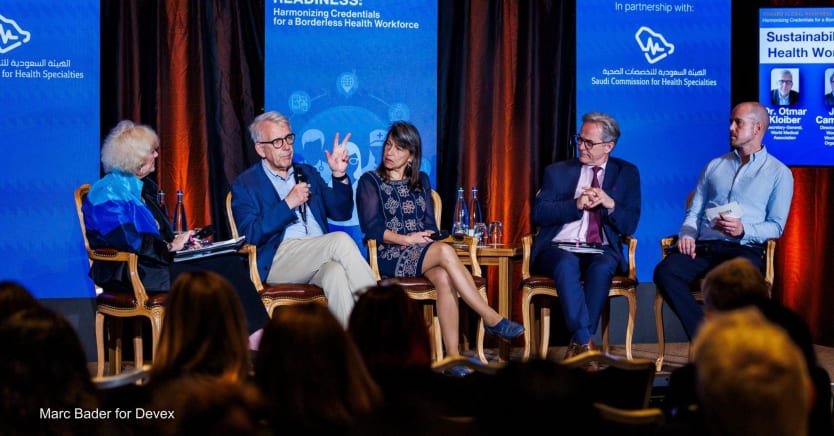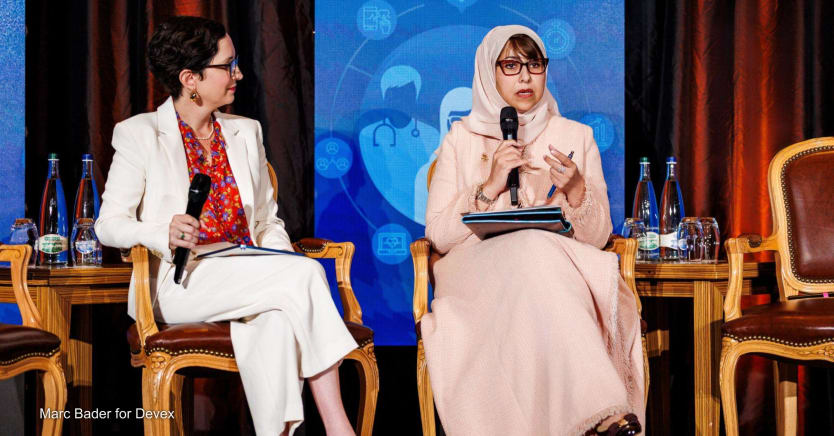‘It will collapse’: Global health leaders warn of looming workforce crisis

By 2030, the global shortfall of health workers is projected to reach 11 million — a deep gap that threatens the resilience of health systems and undermines progress toward universal health coverage. Low- and middle-income countries, or LMICs, will be hit hardest, especially as aging populations and chronic disease burdens escalate demands on care.
In response, a high-level event at the 78th World Health Assembly — sponsored by the Saudi Commission for Health Specialties, known as SCFHS, and hosted by Devex — convened global health leaders to explore the potential of harmonizing credentials to build a mobile, capable, and connected workforce.
As Dina Alismail of SCFHS put it: “Workforce is the heart of the health care system. Without the workforce, we will not be able to survive. It will collapse … So we’re pleased to have this opportunity to speak with our global colleagues and health advocates — who speak the same language — and to align together … before it becomes a crisis for us.”
The discussion focused on scalable models, international collaboration, and the regulatory developments needed to empower health workers, wherever they’re needed most.
Credentialing needs to be the way forward
As health worker migration accelerates, the absence of harmonized, interoperable credentialing systems is becoming a major bottleneck to global deployment. Most professionals from LMICS still carry basic paper certificates that fail to reflect the full scope of their training and skills.
“If I’m a physician who’s done a program in antimicrobial resistance … What do you have today? A piece of paper,” said Jim Campbell, the World Health Organization’s director of health workforce. “Then you want to go and work in Saudi or the United Arab Emirates. What value does that little piece of paper have? Minimal.”
Global efforts are underway to address the gap. Dr. Otmar Kloiber, secretary-general of the World Medical Association, pointed to the World Federation for Medical Education’s accreditation framework, which many medical schools have adopted and is now extending into postgraduate medical education.
But making credentialing effective across borders requires government buy-in and working within their structures. “You must work with all components of the government to get these kinds of credentialing standards to be consistent and to be accepted,” said Leslie Mancuso, president and CEO of Jhpiego.
Public sector wage caps are undermining health workforce sustainability
Efforts to build and retain a robust health workforce are colliding with a persistent barrier: Public sector wage caps prevent many governments from hiring the professionals they train.
“These wage bills are externally imposed. These are not decisions that are made within the country,” said Dr. Joia S. Mukherjee, associate professor of global health and social medicine at Harvard Medical School and chief medical officer at Partners In Health.
The result is a system in which qualified health workers go unpaid, driving attrition, informal charging practices, and ultimately professional disillusionment. “In Liberia and Sierra Leone, the majority of public sector staff are volunteers,” Mukherjee said. “They’re not paid at all. They show up to work and try to maybe charge the patients at the bedside for this or that.”
Mukherjee urged the global health community to confront these structural constraints directly — especially as donor funding declines. “We need a lot of people to put their brains together,” she said, adding we need to start reimagining new models for “Global Health 3.0.” “What does [global health] look like without the massive influence of the United States? Maybe there are some new flexibilities we can explore.”

The need for country-led coordination
With donor funding in decline and a growing number of players operating in parallel, panelists called for a more streamlined, government-led approach to health workforce development — one that prioritizes country leadership and reduces duplication across NGOs, U.N. agencies, and donors.
“The rest of us have to eliminate duplication,” said WHO’s Campbell. “That has to be one of the solutions that we actually agree to as a result of this World Health Assembly — eliminate duplication, overlap, and competition. Let’s come back to core partnership in support of [countries].”
A critical part of that shift, panelists said, is investing in national health workforce information systems that give governments visibility into staffing needs and deployment — “who they have, what they have, and where they're needed within that country,” said Jhpiego’s Mancuso.
“No more surveys … Help the government measure the workforce, help the government determine its policy, then support them to implement that,” Campbell added.
Watch the full session via YouTube.
Search for articles
Most Read
- 1
- 2
- 3
- 4
- 5








